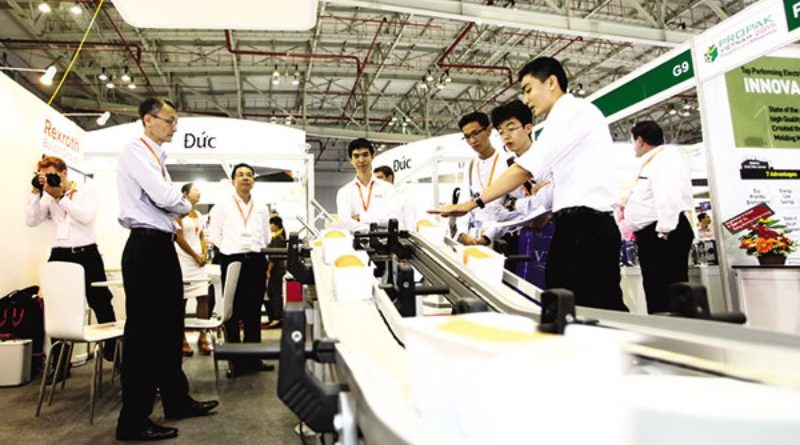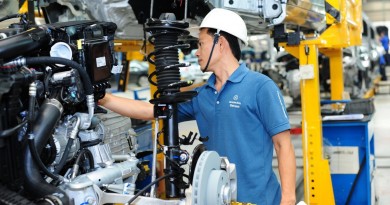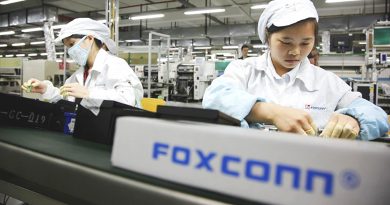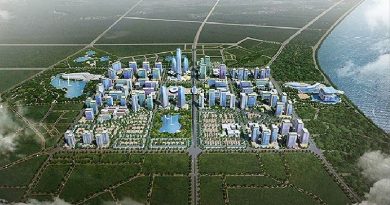Regional hub for German investors
With Vietnam’s significantly improved business climate and large consumer demand, Germany’s investment and goods flows into the country – one of their most important markets in Asia – are set to grow. Thanh Dat reports.
German-backed lighting supplier Osram Vietnam is busy completing a contract for a large project which will provide lighting consultancy and equipment for Sala City in Ho Chi Minh City’s Thu Thiem New Urban Area over the next few months. Sala City is one of the biggest property projects in southern Vietnam.
“Aside from Sala City, Osram is supporting many key projects in Vietnam such as the Saigon Seaport, the Tan Hoang Minh building, Gold Plaza, the InterContinental resort on Phu Quoc, and many factories in Vietnam,” the firm’s CEO Do Huu Hau told VIR.
Osram Vietnam, which currently accounts for 30 per cent of Vietnam’s LED lamp market, plans to expand its LED product portfolio in the country with several hundred new product types.
Osram considers Vietnam its key growth driver in Asia as the country is one of the two markets with the highest growth in sales in the region. “We continue to expect a growth rate in the double digits this year, as our growth rate has been over 20 per cent annually over the past 10 years,” Hau said.
A regional hotspot for investment and goods
According to Germany’s Federal Ministry for Economic Affairs and Energy, thanks to its central location in the Asia-Pacific region and a large number of agreements, Vietnam provides good business opportunities for many German firms wishing to invest, especially in the manufacturing sector and in transport and energy infrastructure.
The growth potential for exporting companies is particularly great in the fields of machinery, chemical products and pharmaceuticals, motor vehicles, and electrical engineering.
Bosch Vietnam told VIR that it wants to expand its business and investments in Vietnam, which is one of its growth drivers in Southeast Asia. “In the fiscal year 2016, Bosch recorded growth of more than 40 per cent in Vietnam. Bosch will continue to develop new business opportunities and increase its market presence for all business segments within the country,” said Guru Mallikarjuna, newly-appointed managing director of Bosch Vietnam.
In 2017, Bosch is investing $47 million in our plant in the southern province of Dong Nai, and plans to increase the capacity and competency of its research-and-development workforce.
“We look forward to joining hands with the local government and businesses to develop tailor-made solutions for smart homes and buildings, smart cities, connected mobility, and Industry 4.0 to improve the quality of life for city-dwellers,” he said.
Siemens Vietnam president and CEO Pham Thai Lai said that, as one of the fastest-growing markets in the region, Vietnam is strategically important for Siemens – especially given its large population. According to Lai, Vietnam also serves as a regional hub, due to a number of trade agreements between Vietnam and global markets, such as the EU-Vietnam Free Trade Agreement. These will further boost the economy and make Vietnam an even more attractive investment target in the future.
In September, Vingroup and Siemens signed a memorandum of understanding (MoU) to promote technological co-operation, with both parties agreeing to consider feasible business models for co-operation in order to develop sustainable infrastructure and industries in Vietnam, including the automobile industry.
In early July, during Prime Minister Nguyen Xuan Phuc’s visit to Germany, nearly 300 representatives of German and Vietnamese firms participated in a German-Vietnamese business forum focusing on business opportunities. At the forum, 28 co-operation agreements collectively worth €4 billion ($4.8 billion) were signed.
Vietnam’s FPT Group, for instance, inked strategic co-operation deals with Siemens and BPCE International. FPT will co-operate with Siemens to utilise MindSphere, an open Internet of Things (IoT) platform based on cloud computing. The two will train some 1,000 workers in Vietnam. FPT will work with BPCE International in developing solutions for digital banking.
Phuc met with leading German firms including Siemens, BMW, Deutsche Bank, Talanx, Schaeffler, Philips Lighting, and BPCE International.
The German firms expressed their wishes to co-operate with Vietnam in the areas of healthcare, high-tech agriculture, renewable energy, education and training, and smart power-saving solutions.
According to these firms, Vietnam has many advantages, such as a workforce very keen on knowledge and development. Additionally, Vietnam’s urbanisation and industrialisation are taking off strongly and the country is envisaging a smart economy.
These trends offer great opportunities for companies to widen their product offerings, especially in the areas of connected solutions for smart cities and Industry 4.0.
Bayer Healthcare Pharma chief financial officer Julio Triana said the firm has been operating in Vietnam for 20 years and hopes to make a stronger investment in healthcare and agriculture.
Philips Lighting DACH’s CEO Karsten Vierke affirmed his company’s wish to invest in human resources training and developing smart cities using its latest technology, which can reduce electricity usage by up to 65 per cent.
Meanwhile, Deutsche Bank expressed its wish to expand investment in the finance and stock sectors in Vietnam.
In July, many German packaging and printing firms came to Vietnam in search of investment and business opportunities, especially amid the country’s rising demand for consumer goods and in the pharmaceutical and food sectors. The firms include CGS, Heidelberg, HP, KBA, Kurz, and One Vision.
In May, executives from 20 firms in Germany came to Vietnam seeking investment opportunities in the sectors of high-tech wastewater treatment, air treatment, and environmental pollution reduction technology.
Vietnam’s Ministry of Planning and Investment reported that, as of August 20, Germany had 288 valid investment projects in Vietnam, registered at nearly $1.7 billion. German investments in Vietnam can be found in many sectors, including automobile production, energy, and machinery.
Strong confidence
Do Huu Hau from Osram Vietnam said that his firm “has great expectations for Vietnam’s economic prospects and investment climate, which are significantly improving”.
“Next year, Osram will continue implementing many key lighting projects in Vietnam, such as the VietinBank tower in Hanoi, and Tam Truc Temple – the biggest one in Asia – in the northern province of Ha Nam,” Hau said.
Meanwhile, according to Bosch Vietnam, Vietnam is experiencing a robust urbanisation and industrialisation, with a positive outlook towards a smart economy. “This will help us offer our customers and partners connected cross-domain solutions from a single source. And we are willing to work closely with them,” said Bosch Vietnam’s Guru Mallikarjuna.
In a bid to facilitate German investment and trade flow into Vietnam, Germany’s Baden-Württemberg state, the GDP of which hit $552 billion in 2015, established a representative office in Vietnam in July. Located in Ho Chi Minh City, the office provides advice to firms about the market, business, and investment environment in Vietnam. It also assists Baden-Württemberg businesses in finding partners and exploring Vietnam’s investment environment.
According to the AHK World Business Outlook survey released last year by German Industry and Commerce in Vietnam (GIC/AHK Vietnam), more than half of the German firms surveyed are upbeat about Vietnam’s economic prospects. About 60 per cent expect a good business performance this year, while 58 per cent perceive their business outlook as “positive”. Some 54 per cent are considering an increase in their investment in Vietnam.
“German enterprises are now seeking investment opportunities and further investment in Vietnam, because they see Vietnam as an attractive destination in terms of encouragement by the country’s government and other location advantages,” said GIC/AHK Vietnam’s chief representative Marko Walde.
Source: VIR





